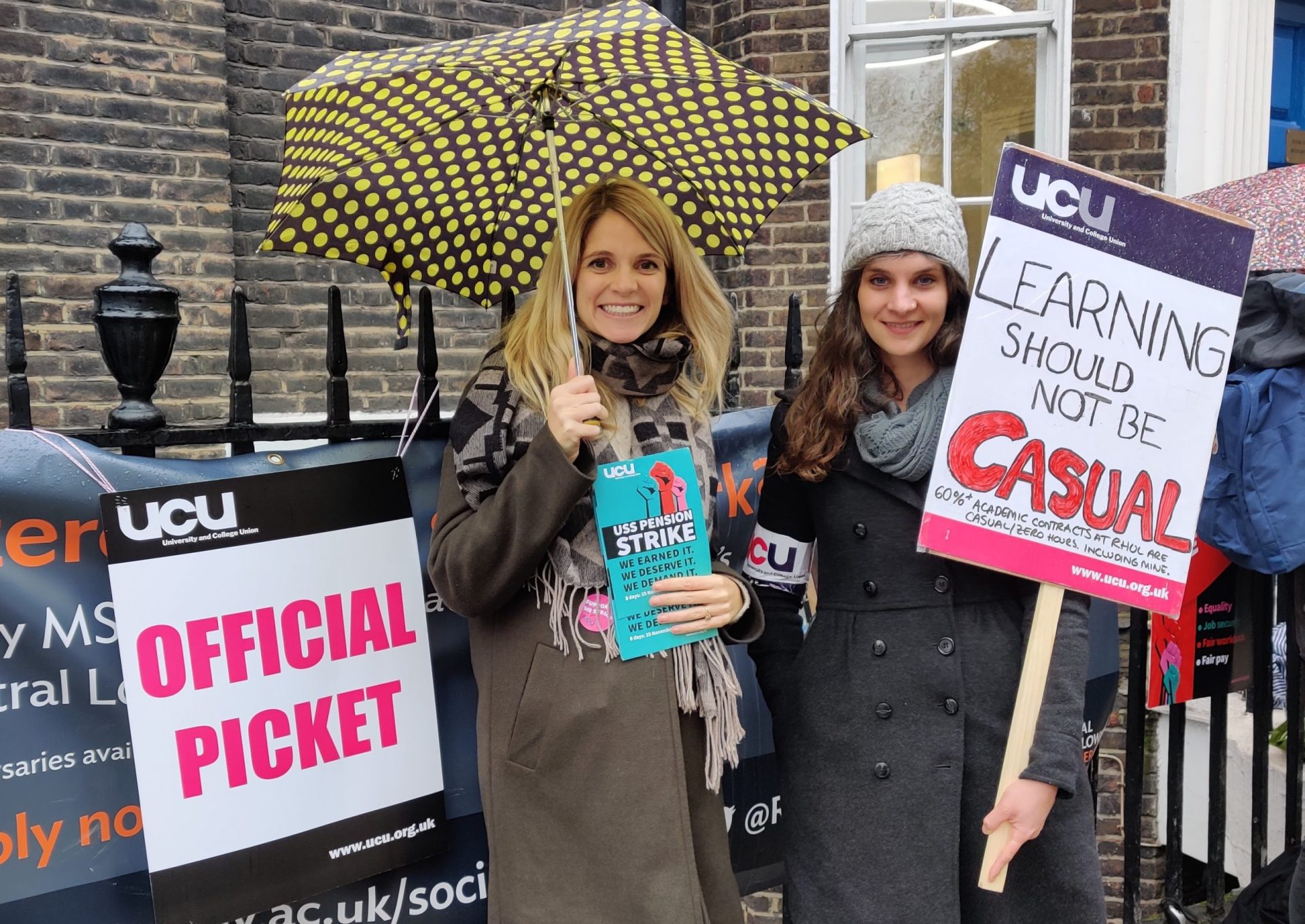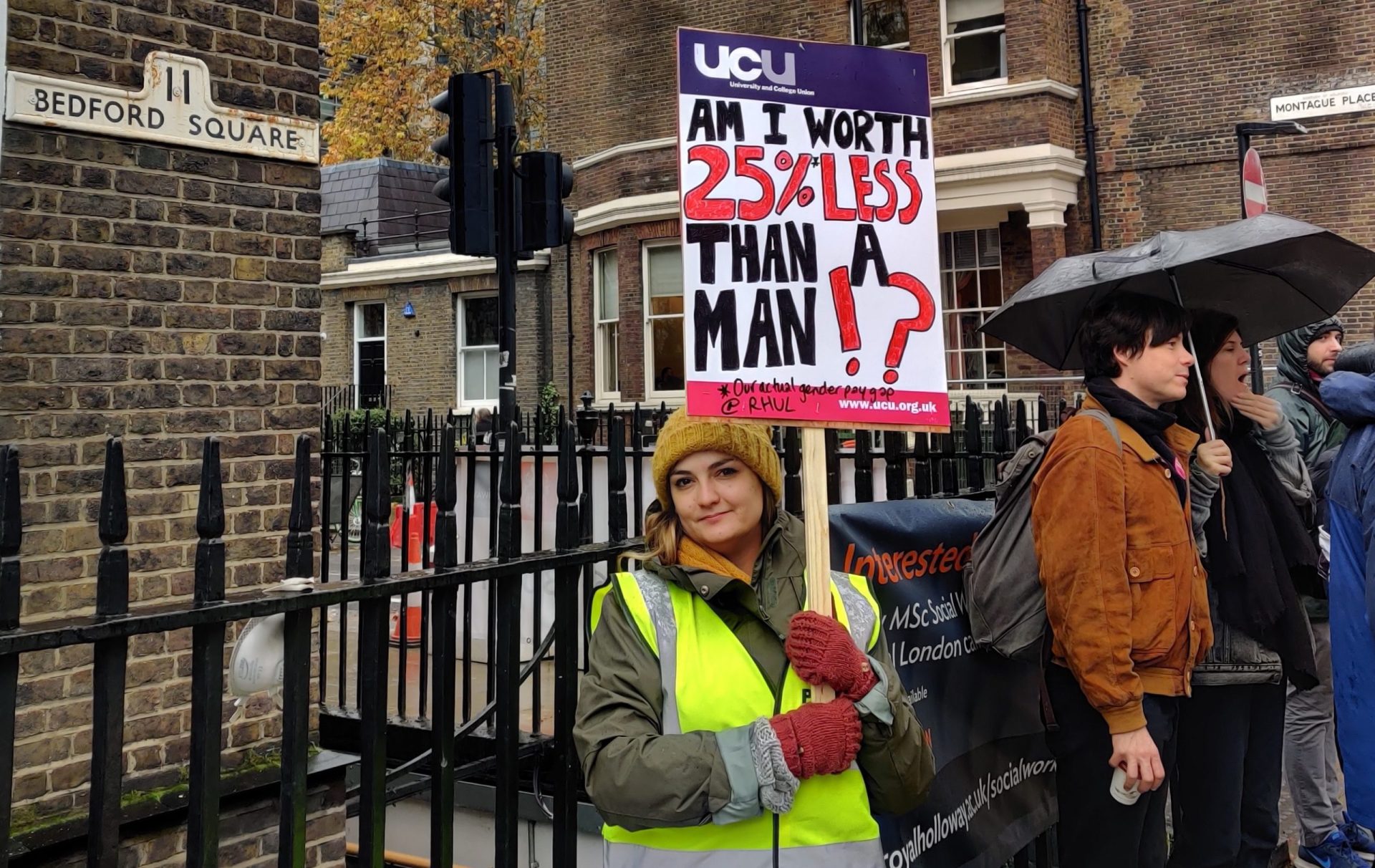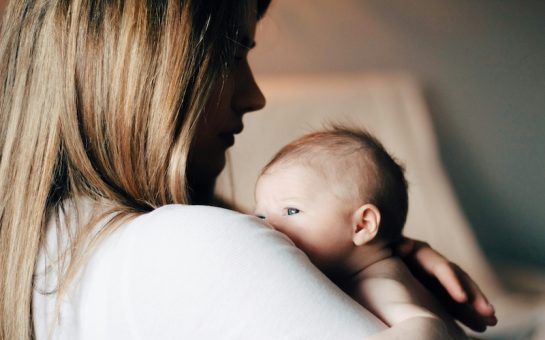![]() By Elizabeth Cook
By Elizabeth Cook
December 4 2019, 18.25
Follow @SW_Londoner
Staff from Royal Holloway University of London are picketing at their campuses in Egham and Central London this week as part of nationwide university strikes for better working conditions.
The eight-day strike started on Monday 25 November, and is led by the University and College Union (UCU).
UCU members are fighting for four reasons, which includes the gender pay gap. RHUL’s 2019 Gender Pay Gap Report reveals that their average pay gap is 24.9%, against a national university level of 13%. Their median pay gap is 31%.
Times Higher Education conducted the first nationwide Gender Pay Gap report in 2018, where RHUL stood in 5th position. Royal Holloway’s own 2019 report shows a 2.3% improvement in the mean pay gap YoY, but still indicates women are paid ¼ less than men.
Dr Leah Moyle, lecturer in criminology and sociology at RHUL, said she knew that there was a pay gap but wasn’t aware of the intensity.
“RHUL very much builds its brand upon feminism, on empowering women, and its history with the Suffragette movement,” said Dr Moyle. “To see the level of the gap is really shocking, and I think our students have been quite shocked to hear that as well.”
Supporting the coordination of the picketing was Dr Lauren McCarthy, a senior lecturer in strategy and sustainability.
She said: “RHUL make a big song and dance about the fact that [prominent Suffragette] Emily Wilding Davidson is one of our alumni and the new library has been named after her. Her motto was “deeds not words”, so let’s follow her example here.”
On the issues of higher pay, Dr McCarthy felt it was “preposterous that you would study for seven years to get a PhD”, the qualification needed to teach at a university, “and then you get paid so little”.
She revealed that many staff are now working two jobs, with some working in bars, or in fast food restaurants to try to make ends meet.

Contrary to some UK students asking for a refund on lost lesson time, RHUL’s Student Union held a vote last month to support the strike. Of the 800 votes counted, 70% of students were in full support. In addition, some students have joined the picket line, or baked biscuits for those striking.
Dr McCarthy added: “Students understand what it’s like to enter a job market where you’re not valued. They are appalled that they are paying over £9,000 a year and the teachers, lecturers, administrators are not receiving that in pay, conditions or pensions. So, where is that money going? That is the question they keep asking me.”
UCU members have also been striking for 2018’s agreed pension increase to be capped at an eight per-cent employee contribution, for better job security and for pay increase to match rising workloads.
To keep up with the workload, many are working an extra two days a week. Dr Moyle said working evenings and weekends was necessary in order to prepare for lectures.
Dr Emily MacGregor, a research fellow in Music at RHUL, said: “Think of an hour lecture as an hour of stand-up comedy. An hour of performance for people that you need to prepare in a lot of detail.”

Dr MacGregor is among the 62% of RHUL staff on a temporary contract, despite having finished her PhD three years ago – and two thirds of those deemed as the ‘casual workforce’ are women.
One of the picketers, Dr David Yuratich, a lecturer in law at RHUL insisted there is no alternative to striking.
“Nobody wants to strike, no one wants to disrupt [the students’] education, but this is a sector that is really stretched, and we feel that this is the last resort because people aren’t listening,” he said.
In response to UCU’s current strike, a representative from RHUL said:
“We understand the strength of feeling amongst staff in relation to pension provision, and the value placed on pensions, pay and conditions.
“We appreciate that the recent valuations of the USS pension scheme have created uncertainty and concern that employees (and employers) will be called upon to increase contributions in order to maintain existing pension benefits.
“The representative bodies, Universities UK (for pensions) and Universities and Colleges Employers Association (UCEA, for pay), remain open to further talks with UCU to discuss how the dispute can be resolved.”
“While we recognise union members’ right to take strike action, we have a duty to meet the needs of students and will be working hard to minimise the impact of any action on them. Our priority during the period of the action is to continue support our students to succeed.”




